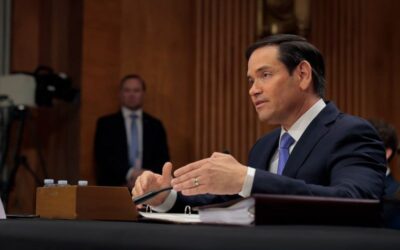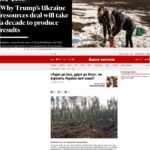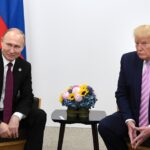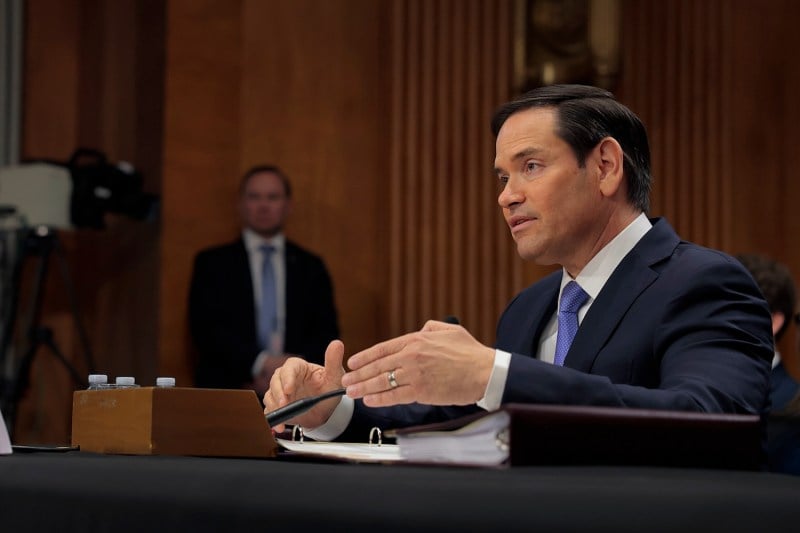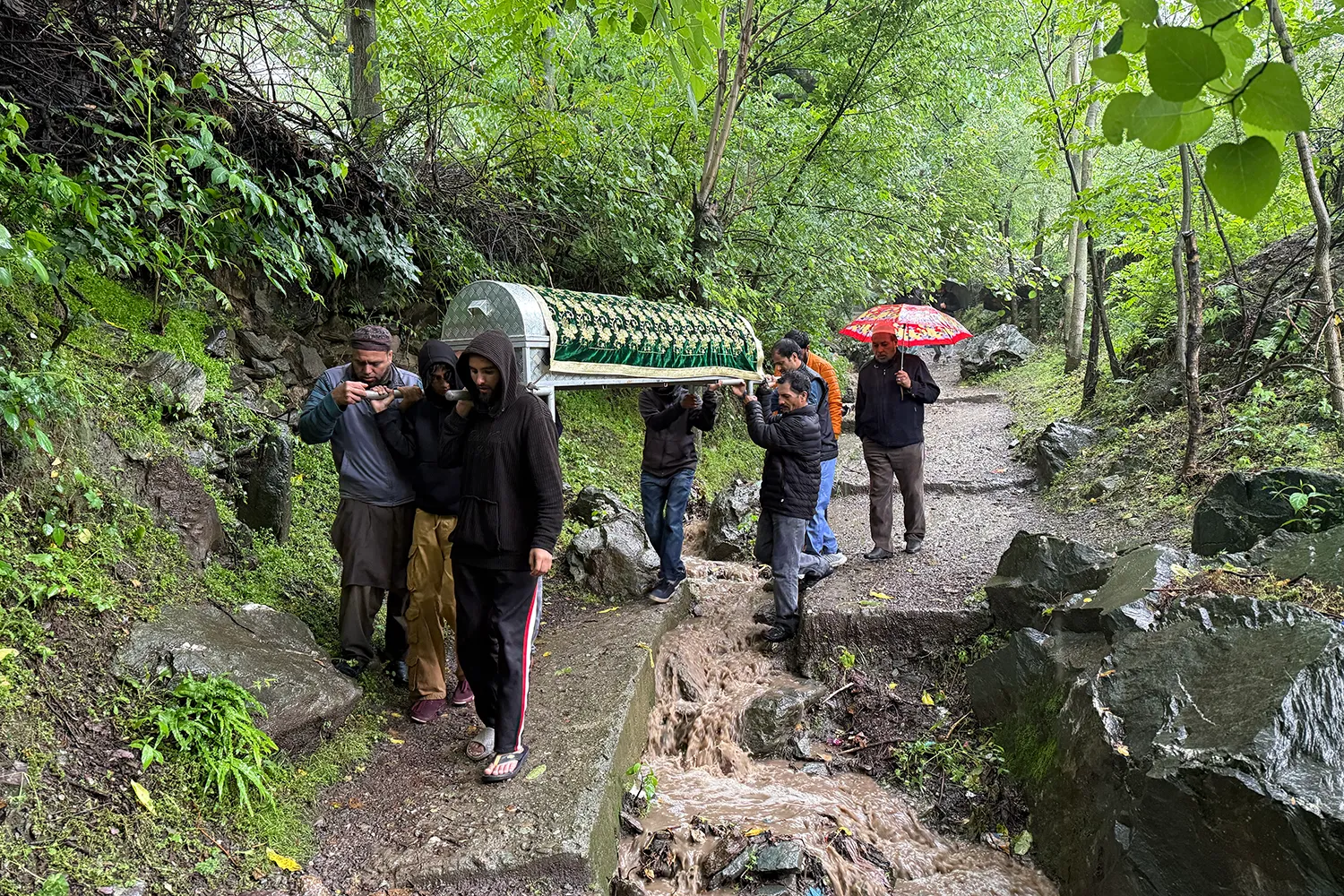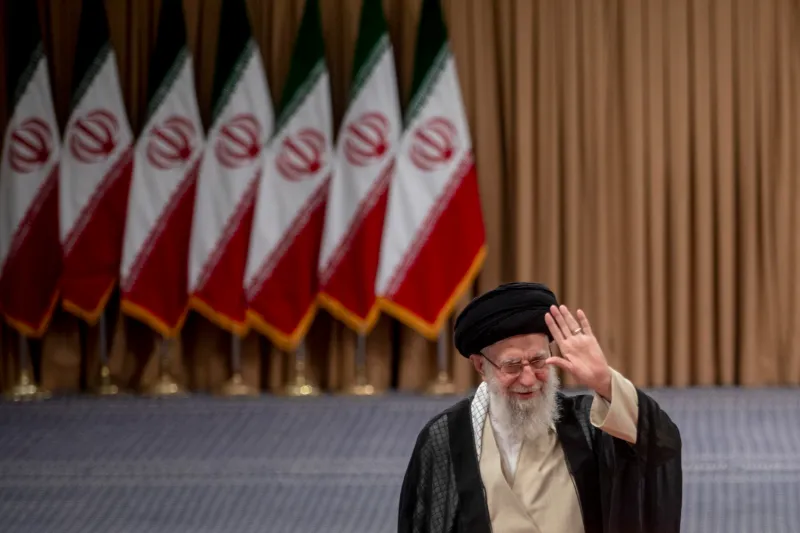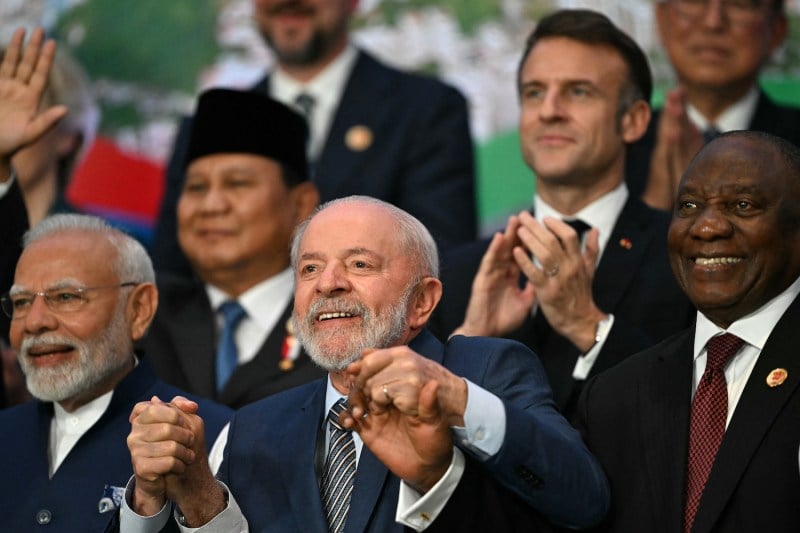How to Assess Trump’s Early Moves
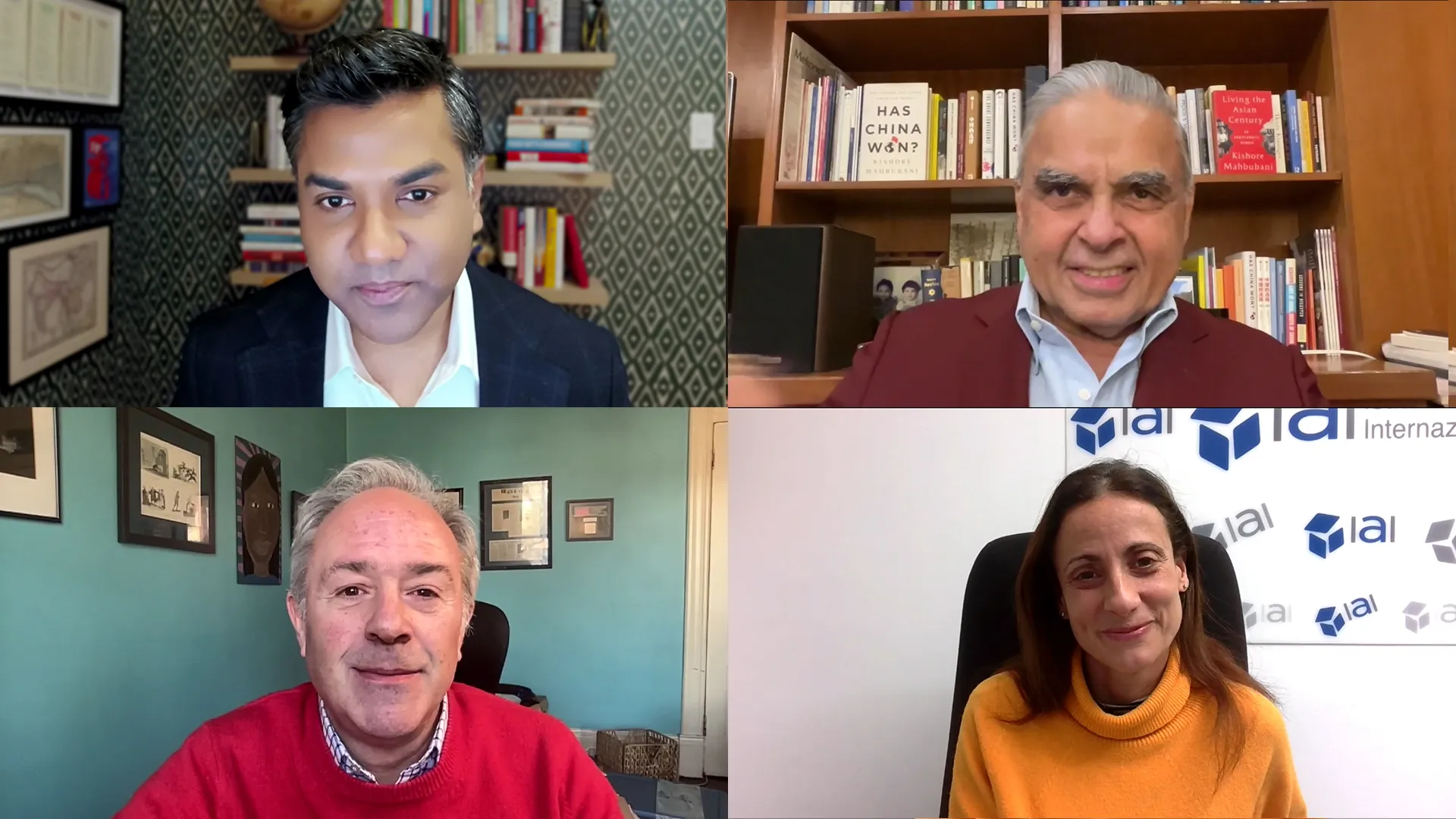
How to Assess Trump’s Early Moves
On FP Live, three experts on three continents try to find the signal in the noise.
If the Trump administration’s strategy was to “flood the zone” with a torrent of initiatives, orders, and audacious ideas, it’s working. From using tariffs as a foreign-policy cudgel to slashing the federal bureaucracy, it’s a challenge to keep up with what’s actually happening.
How is the world reacting? And how does one try to find a signal in the noise? On the latest episode of FP Live, I spoke with three experts on three continents: Edward Luce, a Washington-based Financial Times columnist; Nathalie Tocci, a Rome-based former advisor to Brussels; and Kishore Mahbubani, a storied Singaporean diplomat. (Note: The discussion took place before Trump’s announcement of a plan to “take over” Gaza, which FP has covered separately here.) Subscribers can watch the full discussion on the video box atop this page, or follow the FP Live podcast. What follows below is a condensed and edited transcript.
If the Trump administration’s strategy was to “flood the zone” with a torrent of initiatives, orders, and audacious ideas, it’s working. From using tariffs as a foreign-policy cudgel to slashing the federal bureaucracy, it’s a challenge to keep up with what’s actually happening.
How is the world reacting? And how does one try to find a signal in the noise? On the latest episode of FP Live, I spoke with three experts on three continents: Edward Luce, a Washington-based Financial Times columnist; Nathalie Tocci, a Rome-based former advisor to Brussels; and Kishore Mahbubani, a storied Singaporean diplomat. (Note: The discussion took place before Trump’s announcement of a plan to “take over” Gaza, which FP has covered separately here.) Subscribers can watch the full discussion on the video box atop this page, or follow the FP Live podcast. What follows below is a condensed and edited transcript.
Ravi Agrawal: Ed, if you had to have a broad takeaway from Trump’s first two weeks in office, what would it be?
Ed Luce: It would be Elon Musk’s role. It would be the takeover of the federal bureaucracy, his hostile takeover of the Office of Personnel Management, of the federal payment system, of the General Services Administration, which runs federal real estate, and, of course, his near- shuttering of the U.S. Agency for International Development. This is an extraordinary, unprecedented challenge to U.S. regular order and the rule of law, because he has no official position to do this and is, of course, unconfirmed by the U.S. Senate. There is also a galactic scale conflict of interest given Musk’s multibillion existing contracts between his companies, the federal government, and where his own multifarious business interests clash with federal government and regulators that he’s planning to shut down or denude. And, of course, from the global perspective, that does impinge on U.S.-China relations. A third of Tesla’s sales take place in China, and his great regulatory hopes for autonomous cars actually lie with Chinese regulators. So that, to me, is the most important. Keep your eye on the money and the money man.
RA: Very interesting. Natalie, you’re in Rome. It is striking to me that some of Trump’s biggest attempted moves so far have been not on adversaries, but on allies. So you have the threat of tariffs, demands for high defense spending among NATO members, questioning Greenland’s sovereignty. How worried is Europe?
Nathalie Tocci: Very worried. There are three main points, some of which were predictable, but all of which are very, very concerning. We knew that Trump has a protectionist agenda. We knew that there would be talk about tariffs. Now, the move has not been made yet on Europe, but everyone anticipates that this will be the case. And the big concern is whether Europe will stick together. Now, in principle, it should, given that this is a competence at a supranational level. But it’s fairly clear that Trump is going to try to divide and rule. In particular, he may offer deals to his friends, like [Hungarian Prime Minister] Viktor Orban and [Italian Prime Minister] Giorgia Meloni. The question is whether these leaders will direct him to Brussels or whether they’re going to fold, given that they are Euroskeptic deep down.
This brings me to the second point, which is the all-out assault on democracy. Whereas domestically, there’s the MAGA agenda, at the European level, there is a mega agenda. In particular, Musk has been explicitly supporting the various AfD, Fratelli d’Italia, and Reform parties in Europe. And, of course, the aim is dividing Europe because it’s much easier, obviously, to deal with partners that are no longer partners, but rather a mix of adversaries and divided vassal states.
The third point is that a Trump 2.0, as opposed to Trump 1.0, has a far more explicitly imperial nature to it. And this is where the threats on Greenland come in. In the first few days, there was a sense that Trump should be taken seriously but not literally. As time has gone by, there is a growing fear that he should be taken literally, as well. And so, this Trump administration is not only nationalist-protectionist and sort of authoritarian but possibly imperial, as well.
RA: Kishore, you are in Singapore now, and you were in India earlier. How are you seeing the early days of the Trump administration?
Kishore Mahbubani: Most Asians are shocked by the complete chaos in Washington, D.C. To Ed’s point about dismantling the government, Asians find that very strange because Asians like order, and predictability, and good governance. At the same time, I also warn my Asian friends: Whatever you do, don’t underestimate the United States, because the United States is a very unusual society. Chaos brings down most societies. For whatever complex historical reasons, political chaos actually strengthens the social and political fabric of the United States, and over the long run, makes it a stronger society.
Nonetheless, in Asia, the most important player is clearly China. And China is watching Trump more closely than any other country is. So far, Trump is delivering at least two goodies to China. Number one, he’s clearly playing a short-term game, not a long-term game. China understands better than most countries that a new world is emerging—one that is multicivilizational, multipolar, multilateral. The Chinese are preparing for the world of 2050 rather than the world of 2025. Trump is running a sprint. China is running a marathon. They say the sprinter may pass me, but in the long run, I will win.
Of course, the Chinese are also prepared for a big blow from Trump. They are ready for it. They’re holding their fire, but it will come, and then they’ll retaliate.
RA: Part of the thinking around Trump is that he is openly transactional, and countries know it. So do those countries play him at his own game? That may have happened with Mexico and Canada, where Mexico delayed the threatened tariffs by agreeing to put 10,000 troops on the border when they already had similar plans to do so. Canada, too, already had an ambitious, preexisting border security plan. It strikes me that moving the needle on actually stopping fentanyl flows gets lost to the theater of it all.
EL: Of course, in Canada’s case, [Canadian Prime Minister Justin] Trudeau came up with a fentanyl czar. But the fentanyl seized from Canada is not even a drop in the bucket. It’s pure kabuki.
Ordinarily, when you have a trade dispute, you would negotiate. And if those negotiations broke down, you would then impose punitive measures like raising tariffs. Trump started the other way around. He announced punitive measures, and there was some confusion as to what Canada or Mexico needed to do to avoid those. Now, we learn it’s theater, at least for 30 days. Trump can declare a win to the no-information voter, but it is actually a win at least for 30 days for Canada and Mexico. I’m not at all confident that those levels of tariffs won’t resume in 30 days, depending on Trump’s mood.
We did see a mini dress rehearsal for this with Colombia. Trump threatened massive tariffs, a visa ban, etc. And it was no coincidence that day that the Chinese ambassador to Colombia said China-Colombia relations have never been stronger. Trump’s transactionalism is dispensable. And so, your confidence when you make a deal with Trump is low already, given Trump’s modus operandi, and I suspect it’s getting lower all the time.
This is, as Kishore mentioned, a great opportunity for China to say, “Look, we uphold the rules of the system. We uphold multilateralism. We uphold a trade regime with clear and transparent regulations.” Trump threatens basically to self-cannibalize if he goes on like this. And that will do great harm to America’s ability to strike deals around the world.
RA: Chinese leaders are repeatedly saying that they are in favor of a rules-based order, most recently at Davos. And it strikes me that Trump is playing into their hands.
KM: There’s a solid historical reason why the Chinese like the international rules-based order. Firstly, the past 40 years of human and social development in China have been the best 40 years in 4,000 years of Chinese history. The Chinese have asked themselves fundamental questions about why they suffered a century of humiliation, from 1842 to 1949. And among the answers was because China closed itself off from the rest of the world. The only reason why China has been able to integrate with the rest of the world is because of the Western gift of the post-1945 rules-based order. And certainly, China could not have emerged as the world’s largest trading power without the World Trade Organization, for example. So, China appreciates this model because it has worked for China.
But at the same time, I also want to emphasize an equally important streak of pragmatism in China. I can well imagine a situation wherein the Chinese get an American acceptance of the “One China” policy locked in, which would be an incredible gift to China. And if Trump asks a high price for it in trade or economics, the Chinese pay the high price and get something critical to them. Because, at the end of the day, Taiwan represents the last living symbol of the century of humiliation. So they want a “One China” policy, and they’re prepared to work out a good deal with Trump for that, which creates an opportunity for a transaction.
RA: Nathalie, build on that idea—that unlikely ideas can be struck—from a European perspective. If you were still advising Brussels, how would you tell European leaders to approach this new administration?
NT: If we’d had this conversation a month ago, I would have probably said Europeans are going to bend over backwards to please Trump, particularly because they’re concerned that he’s going to disengage from Ukraine and European security. And so, they may end up being more assertive toward China. And I’m no longer sure this is how it is going to, or how it should, play out. China actually played the first Trump administration rather skillfully, presenting itself as the defender of the multilateral system while the United States temporarily checked out of that system. And there was quite a bit of entente between Europe and China.
Now, over the last few years, that relationship has obviously become more complicated because of the Russia-China angle and because Europeans have a greater sense of what their economic security should be about. However, much of the reason why Europe became harsher toward China has to do with its partnership with the United States.
And now, there is a kind of growing understanding that Europe can’t afford to have a two-pronged trade war with both China and the United States. And, given a choice, we don’t want a trade war with the United States, but if we don’t have a choice, then maybe we should take a timeout with China. Moreover, if China plays its cards skillfully again, by perhaps cooperating on European security and Ukraine, it may well turn out that Europe will feel, well, this is the time in which we try not to further complicate relations with others, because we have more than enough with Trump himself.
RA: One of the animating principles of Trumpworld is that the United States needs to pull back from global conflicts. I was struck recently by an interview that Secretary of State Marco Rubio gave to Megyn Kelly, in which he said that the unipolar moment might be over. I think he is arguing that there have been multilateral, multipolar moments in the past, and the United States really is just going to look after its own interests and really not care that much about what’s going on elsewhere.
EL: Marco Rubio is right. He would have been right if he had said that 15 years ago, though. I think the unipolar moment has been over for a while. A lot of my American and European friends are surprised by how unfazed the world, particularly the global south, is by the return of Trump. And that is because, I think, the proclamations and insistence on the liberal international order by [President Joe] Biden, by [President Barack] Obama, and others has been seen as hollow and hypocritical for a long time, and understandably so. And those double standards have been very starkly on display since Oct. 7, 2023. America seems to want the law for its enemies but special dispensation for its friends. And so, the law isn’t the law, because the law is supposed to be blind. So we’re losing what I think of as “the preachy American” and replacing it with “the ugly American.” And for those who always thought America had an ugly underside, this is not such a shock after all.
Now, I happen to believe in values, and rules, and the international order. That system was set up by the United States and can only really be sustained by a United States that believes in it. The United States clearly no longer believes in it. That is the unequivocal message from Trump. Marco Rubio used to believe in it, but he serves Trump. He’s a loyalist to Trump. But you don’t serve Trump unless you pledge personal loyalty, not just to Trump, but to that philosophy. It really doesn’t matter what Marco Rubio used to say. All that matters is what Trump thinks now; parroting that is the condition of Rubio’s job. And the same applies to Mike Waltz as the national security advisor. The same applies to John Ratcliffe at the CIA. This is an administration of loyalists and Trump’s instincts are what will govern it.
RA: Nathalie, it’s fair to say that the last couple of weeks have seen the reemergence of hard power at some significant cost to American soft power. From your vantage point in Europe, how are European leaders looking at those developments? How do they see the trade-off between deploying hard power at the cost of soft power?
NT: Starting with the soft power. The rest of the world is largely unfazed by this. There are two explanations. The first is that the 85 percent of the world outside the West likes the transactionalism and is not that fussed about the rules and the norms. I personally don’t buy that explanation. I think it’s a different explanation, which is the fact that the 85 percent views someone like Trump, aggressive as he is, as symptomatic of a multipolar world, but one in which the United States does not have the ambition to set those global rules and laws. Now, this leaves the Ukraine-Gaza distinction. That came at the total erosion of soft power, which largely relies on reputation, and credibility, and legitimacy, as far as the West is concerned. Here, the Europeans have been just as bad as what the United States has been doing, with the hypocrisy and the double standards.
Moving on to hard power. As far as Europe is concerned, this is a story about Europe and the relationship with Russia and the transatlantic relationship. So if we look at Trump as simply the symptom of a structural trend of U.S. disengagement from European security and given a war which is going to carry on in some shape or form for the foreseeable future, either you get your act together on hard power or, again, you’re in deep trouble. So I make a geographic distinction, as far as Europe is concerned, between soft and hard power. The soft really relates to the 85 percent. The hard relates to the European continent itself in this context of a structural realignment between U.S. and European interests.
RA: Ed, you kicked off this conversation by looking at Musk and his influence so far in dismantling what he likes to call the “deep state.” Were you to project forward, what trend lines should we keep an eye out for?
EL: Musk is a good way to begin answering that question. It’s been assumed that this town is too small for the two for them: Trump and Musk. But, actually, the more laws that Musk allegedly breaks, the more constitutional norms he trashes, the more he is absolutely beholden to Trump as his pardoner. The idea that oligarchs own politicians is the wrong way around. I refer you to Russia. It’s the leader, the strongman, who owns the oligarchs. And it’s very clear that Musk is beholden to Trump. But that trend, the interaction between oligarchy and politics in the United States and around the world, is now a hugely important feature of democracies and non-democracies alike. You were talking about soft power. The United States has been seen as an attractive model by many parts of the world; I don’t think it’s going to look quite so attractive anymore.
In terms of what to watch, the idea that China could actually be the big bet in terms of climate change—because of its transformation in terms of electronic vehicles and clean tech, and its extraordinary competitiveness in green energy, and the cheapness of heavily subsidized exports of clean tech—those could make China the real game-changer here, because China doesn’t repudiate the idea of manmade global warming, hasn’t walked away from the Paris climate agreement, as Trump has just done. And China is in a good position, as Nathalie felicitously put it, for the European reappraisal of this triangular relationship. Europe is more receptive to Chinese investment, and job creation, and clean tech. And now that Trump is threatening aggressive economic warfare in Europe, a Europe-China concord or understanding that calls timeout on their trade disputes could have possibilities beyond climate change implications to geopolitical realignment implications. So that’s another one to watch.
RA: Kishore, what about the role of so-called swing states in geopolitics? You were just in India. How is a country like India, or Indonesia, or Nigeria, or Saudi Arabia looking at these emerging next three or four years?
KM: There’s no question that many of them are becoming aware that the mental maps they had over the last 40, 50 years of an international system resting on a benign American interpretation of international law, from the World Trade Organization and the World Health Organization—it’s all gone. So now what do you do? And so, clearly, lots of independent deals are going to take place around the world. Nathalie mentioned a new thinking that may emerge in Europe toward China. When I was in Mumbai having tea with a very well-informed Indian, I was shocked to learn that Indian-Chinese relations have improved significantly in the last few weeks. After the Indian foreign secretary was in Beijing recently, direct flights resumed, and Chinese businessmen got visas to come to India. And, frankly, [Indian Prime Minister Narendra Modi’s] government has realized that if you want to build India as a manufacturing power, which there is tremendous potential for, you’ve got to work with China. As Tom Friedman pointed out, China’s shared global manufacturing in the year 2000 was 5 percent. By 2030 it will be 45 percent—45 percent of global manufacturing is coming from China. So you cannot possibly build manufacturing industry anywhere in the world, including the United States, unless you collaborate with China. So therefore, more and more swing states are going to feel the gravitational pull by China. Frankly, in that sense, if the Chinese play tactfully and lowkey, Trump could be a big gift to China.
RA: Nathalie, foreign aid is one of the clear casualties in the last couple of weeks. There have been immense ripple effects with the U.S. Agency for International Development not able to disperse money in Ukraine and other global conflicts. What is your sense of what that means in the long term?
NT: The first is the immediate effect: a great deal of humanitarian and development assistance coming offline with implications for all sorts of third countries. But, then again, how will other countries step in or not? This goes back to the conversation on soft power. As U.S. soft power erodes, other countries may increase their own soft power if they manage to step in.
To that point, there’s another dimension which brings us back to this conversation about rules and a rules-based system. Because if you can say, “Well, a contract is null and void,” these are agreements that are signed at the end of the day but so what? Domestically, there are more avenues to seek justice. But internationally, it’s the law of the jungle. I wonder what the medium- and long-term reactions will be to that, because it’s very clear that we all stand to lose, whether we’re big or small. And so, as the old rules are being eroded, there is some opportunity to go back if it is important that some rules exist. So I think that is an element of agency that we could end up seeing as a result of the United States checking out the system that it built.
Ravi Agrawal is the editor in chief of Foreign Policy. X: @RaviReports
More from Foreign Policy
-

Russian President Vladimir Putin looks on during a press conference after meeting with French President in Moscow, on February 7, 2022. The Domino Theory Is Coming for Putin
A series of setbacks for Russia is only gaining momentum.
-

The container ship Gunde Maersk sits docked at the Port of Oakland on June 24, 2024 in Oakland, California. How Denmark Can Hit Back Against Trump on Greenland
The White House is threatening a close ally with a trade war or worse—but Copenhagen has leverage that could inflict instant pain on the U.S. economy.
-

Donald Trump speaks during an event commemorating the 400th Anniversary of the First Representative Legislative Assembly in Jamestown, Virginia on July 30, 2019. This Could Be ‘Peak Trump’
His return to power has been impressive—but the hard work is about to begin.
-

US Secretary of State Marco Rubio greets employees at the State Department in Washington, DC, on January 21, 2025. The National Security Establishment Needs Working-Class Americans
President Trump has an opportunity to unleash underutilized talent in tackling dangers at home and abroad.

